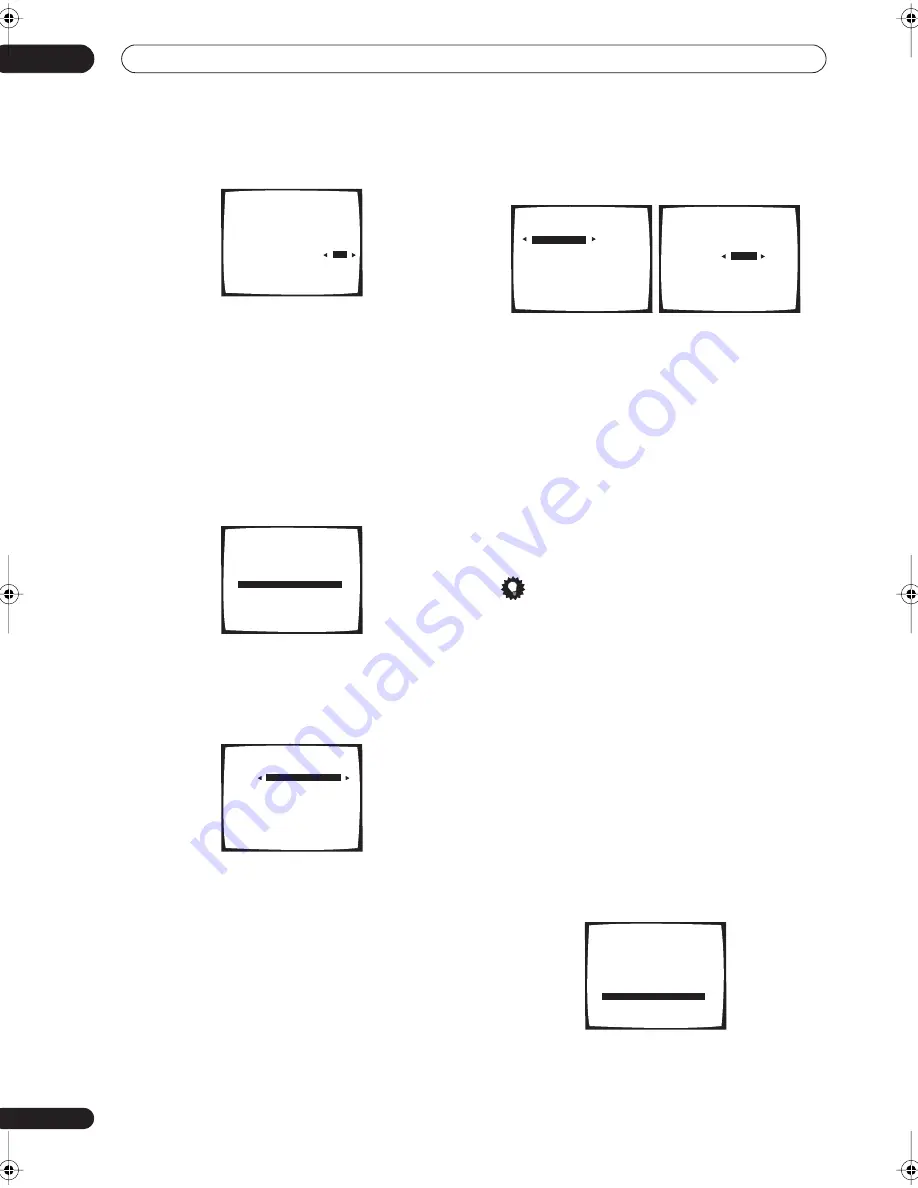
The System Setup menu
06
44
En
3
Select ‘OK’ to copy and confirm.
Setting the Acoustic Calibration EQ manually
Before manually adjusting the Acoustic Calibration EQ,
we recommend copying the
ALL CH ADJUST
or the
FRONT ALIGN
settings from the auto setup above (or
from
Automatically setting up for surround sound
(MCACC)
on page 11) to one of the custom settings.
Instead of just a flat EQ curve, this will give you a
reference point from which to start (see
Copying your
Acoustic Calibration EQ settings
above for how to do this).
1
Select ‘EQ CUSTOM1 Adjust or EQ CUSTOM2
Adjust’ from the Manual MCACC setup menu.
2
Select which method you would like to use to
adjust the overall frequency balance.
It is best to choose whichever one you copied to the
custom setting in
Copying your Acoustic Calibration EQ
settings
above.
•
ALL CH ADJUST
– All the speakers can be set
independently so no special weighting is given to any
one channel. When adjusting, test tones will sound
for each individual channel.
•
FRONT ALIGN
– Speakers are set in accordance with
the front speaker settings. The sound of the test tone
will alternate between the left front (reference)
speaker and the target speaker.
3
Select the channel(s) you want and adjust to
your liking.
Use the
/
(cursor left/right) buttons to select the
channel.
Use the
/
(cursor up/down) buttons to select the
frequency and
/
(cursor left/right) to boost or cut the
EQ. When you’re finished, go back to the top of the
screen and use the
/
(cursor left/right) buttons to
select the next channel.
• The front speakers can’t be adjusted if you selected
FRONT ALIGN
.
• The
OVER
indicator shows in the display if the
frequency adjustment is too drastic and might
distort. If this happens, bring the level down until
OVER
disappears from the display.
Tip
• Changing the frequency curve of one channel too
drastically will affect the overall balance. If the
speaker balance seems uneven, you can raise or
lower channel levels using test tones with the
TRIM
feature. Use
/
(cursor up/down) to select
TRIM
then use
/
(cursor left/right) to raise or lower the
channel level for the current speaker.
4
When you're finished, press RETURN.
You will return to the Manual MCACC setup menu.
Checking your Acoustic Calibration EQ settings
After you have completed an automatic or manual
Acoustic Calibration EQ adjustment, you can check the
ALL CH ADJUST
,
FRONT ALIGN
and custom settings
using the on-screen display.
1
Select ‘EQ Data Check’ from the Manual MCACC
setup menu.
3d. EQ Data Copy
TO
FROM
CUSTOM1
[ ALL CH ADJ.
]
CUSTOM2
[ CUSTOM2
]
Start Copy
[
OK
]
Enter :Start Copy
3.MANUAL MCACC
[
a .Fine Ch Level
]
[ b .Fine Ch Distance
]
[ c .EQ AUTO Setting
]
[ d .EQ Data Copy
]
[
e .EQ CUSTOM1 Adjust
]
[ f .EQ CUSTOM2 Adjust
]
[ g .EQ Data Check
]
3e. EQ CUSTOM1 Adjust
Test Tone Type
[
ALL CH ADJUST
]
Enter :
Next
Return : Cancel
3e. EQ CUSTOM1 Adjust
Test Tone Type:
"ALL CH ADJUST"
[
Left
EQ
]
40Hz : [+ 1.0dB
]
125Hz :
[
0.0dB ]
250Hz :
[
0.0dB ]
4kHz :
[
0.0dB ]
13kHz :
[
0.0dB ]
TRIM :
[
0.0dB ]
3f. EQ CUSTOM2 Adjust
Test Tone Type:
"ALL CH ADJUST"
[
Left EQ
]
40Hz : [
0.0dB
]
125Hz : [ 0.0dB ]
250Hz : [ 0.0dB ]
4kHz : [ 0.0dB ]
13kHz : [ 0.0dB ]
TRIM : [ 0.0dB ]
3.MANUAL MCACC
[
a .Fine Ch Level
]
[ b .Fine Ch Distance
]
[ c .EQ AUTO Setting
]
[ d .EQ Data Copy
]
[ e .EQ CUSTOM1 Adjust
]
[ f .EQ CUSTOM2 Adjust
]
[
g .EQ Data Check
]
VSX_1015.book.fm 44 ページ 2005年3月7日 月曜日 午後7時0分
















































